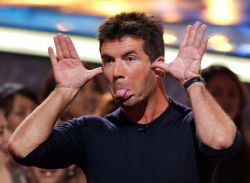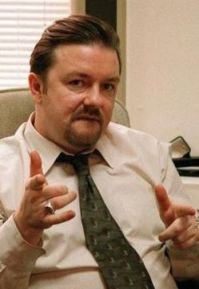This week the BBC News online magazine is running a Portrait of the Decade. Each day has brought a consideration of the words, the events, the people, the objects and, today, the cultural highlights of the decade. I was invited to consider those highlights.
 In years to come, when they look back on the culture of the Noughties, no one will struggle to identify the overarching theme. This has been the decade in which the professional, the trained talent, has had to budge up and make room. A decade ago, who’d have imagined that the biggest stars in pop would be sourced from a Saturday-night talent show? That they’d be casting West End shows by public vote? Or that a plinth in Trafalgar Square would be given over in hourly slots to anyone who fancied making an artistic statement?
In years to come, when they look back on the culture of the Noughties, no one will struggle to identify the overarching theme. This has been the decade in which the professional, the trained talent, has had to budge up and make room. A decade ago, who’d have imagined that the biggest stars in pop would be sourced from a Saturday-night talent show? That they’d be casting West End shows by public vote? Or that a plinth in Trafalgar Square would be given over in hourly slots to anyone who fancied making an artistic statement?
But then reality has been the dominant force of the decade. While out in the really real world the decade was bookended by terrorist atrocity and financial Armageddon, television tried to keep our spirits up by asking which of us wanted to be a millionaire. Answer: anyone and everyone who queued to be on Big Brother, X Factor, Britain’s Got Talent and reality TV’s other offshoots. The Jerry Springer Show even found its cast of brawling attention-seekers turned into an all-cussing, profanity-packed opera.
 Not that stardom necessarily came via television exposure. YouTube ensured that anyone could be the leading character in their own room. MySpace helped a new generation of indie musicians to bypass the music industry's front entrance. And thanks to the rise of the iTunes download, the streaming site Spotify and the consequent collapse in CD sales, they now all have to tour if they want to make money, giving rise to a teeming summer festival culture.
Not that stardom necessarily came via television exposure. YouTube ensured that anyone could be the leading character in their own room. MySpace helped a new generation of indie musicians to bypass the music industry's front entrance. And thanks to the rise of the iTunes download, the streaming site Spotify and the consequent collapse in CD sales, they now all have to tour if they want to make money, giving rise to a teeming summer festival culture.
In another blow for democracy, the podcast and the iPlayer allowed people to consume The Office and Little Britain and The Ricky Gervais Show on their own terms, not to a timetable imposed from on high. The viral phenomenon of the internet validated everyone’s opinion via social networking and chatrooms.
 The big losers of the decade were newspapers. With readers migrating online, they are still wondering how to charge for usage to keep themselves afloat. As people stopped wanting to pay, the freesheet reared its ugly head on trains and platforms. If the book trade has remained healthier, it’s partly down to the rise of the celebrity confessional and memoirs about childhood trauma and several Harry Potter doorstoppers as much as quirky successes like Schott's Miscellany and Lynne Truss's book in praise of punctuation, Eats, Shoots and Leaves.
The big losers of the decade were newspapers. With readers migrating online, they are still wondering how to charge for usage to keep themselves afloat. As people stopped wanting to pay, the freesheet reared its ugly head on trains and platforms. If the book trade has remained healthier, it’s partly down to the rise of the celebrity confessional and memoirs about childhood trauma and several Harry Potter doorstoppers as much as quirky successes like Schott's Miscellany and Lynne Truss's book in praise of punctuation, Eats, Shoots and Leaves.
Meanwhile, attendances for live performance and museums have never been higher. But even in the higher arts the biggest stories have been about people who have clawed their way up from under. Carlos Acosta, our biggest ballet star after Darcey Bussell hung up her slippers, comes from a poor background in Cuba.
 From elsewhere in Latin America, classical music has been mesmerised by the Simon Bolivar Youth Orchestra of Venezuela led by curly-mopped Gustavo Dudamel, the products of an extraordinary system designed to prevent disadvantaged children from falling into crime by giving them an instrument. With luck, a pilot scheme in Scotland will bear similar fruit. In further good news, British black and Asian artists have never been more seen and heard.
From elsewhere in Latin America, classical music has been mesmerised by the Simon Bolivar Youth Orchestra of Venezuela led by curly-mopped Gustavo Dudamel, the products of an extraordinary system designed to prevent disadvantaged children from falling into crime by giving them an instrument. With luck, a pilot scheme in Scotland will bear similar fruit. In further good news, British black and Asian artists have never been more seen and heard.
Not that the past 10 years have all been about keeping it real. In cinema, actors have conceded more ground than ever to CGI. In the biggest blockbusters, the biggest names get to act against blue screens, or provide the voices for Pixar’s immensely popular animations. You could argue that reality TV has produced its own cartoon characters, only on a much smaller budget. Which is what this decade has ultimately been about: making culture cheaper and available for all.
This article originally appears on BBC News online magazine, where readers can vote for their own selection. Read more about the Portrait of the Decade.














Add comment